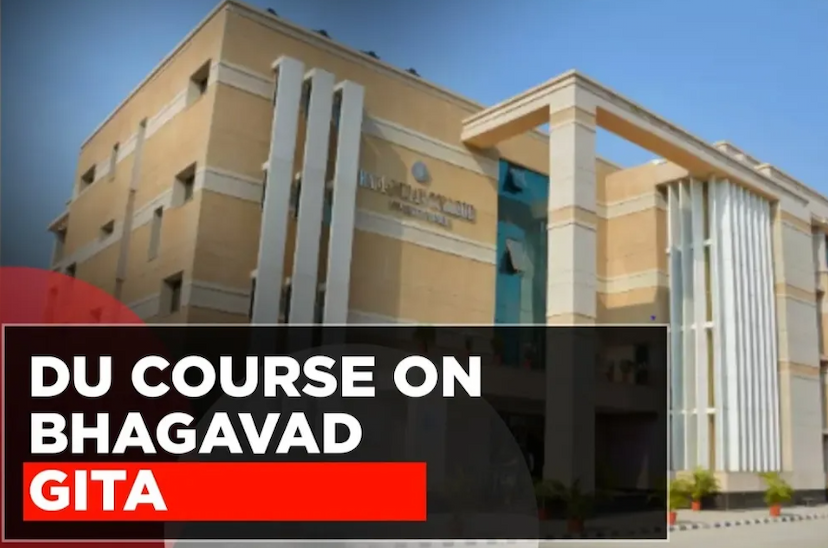Bhagavad Gita Course Controversy: Perspectives and Challenges at Delhi University

Ramanujan College, Delhi University, is facing a Bhagavad Gita course controversy. The dispute surrounding this ancient book, a cornerstone of India’s intellectual legacy, has raised questions about academic independence, cultural sensitivity, and the complex relationship between mandated courses and personal views.
The Bhagavad Gita course debate has raised new viewpoints and problems that instructors and students must consider as they navigate this story. This investigation extends beyond Ramanujan College to discussions on academic curriculum and the delicate balance needed to integrate multiple cultural and religious viewpoints in an educational institution.


Understanding the Bhagavad Gita course Controversy
The genesis of the controversy lies in an email circulated among teachers on December 18, 2023, requesting “mandatory attendance” for a two-hour daily refresher certificate course on the Bhagavad Gita scheduled from December 22 to January 9. The email explicitly stated that newly recruited teaching staff from the past year must register and attend the program offline. In contrast, other teaching staff had the option to attend either online or offline.
Allegations and Objections
Amidst the serene backdrop of academia, objections arose. Some teachers expressed concerns about the course being labelled as mandatory, raising issues of inclusivity and forcing individuals from diverse communities to participate. Additionally, contractual staff voiced fears of potential consequences for not attending, particularly considering the challenges posed during the holiday season.

Response from College Authorities
In response to the allegations, Jigar Champaklal Inamdar, chairman of the college’s governing board, sought to dispel the controversy. He clarified that the course’s attendance was encouraged but not compulsory. Inamdar highlighted the course’s objective: to impart the teachings of the Gita and facilitate an understanding of its relevance in contemporary times. The two-hour seminars were designed to include interactive sessions, conversations, and question-and-answer segments.
Expansion of the Dispute
The initial dispute took an unexpected turn when a second email was sent to teachers, listing 37 professors who had not enrolled for the course. This development widened the chasm, leading to heightened concerns among teachers about potential repercussions. Some teachers, even if hesitant, opted to register for the course following the receipt of the email, accentuating the perceived pressure on faculty members.


Response from Democratic Teachers’ Front (DTF):
As the controversy gained momentum, the Democratic Teachers’ Front (DTF) entered the fray, vehemently urging the withdrawal of mandatory registration and attendance for the Bhagavad Gita course. The DTF accused Ramanujan College’s principal, SP Agarwal, of abusing authority, coercing teaching and non-teaching staff, and termed it an “autocratic trait.” They emphasized the clash between mandatory attendance and the principles of academic freedom and critical thinking.
Course Details
The newly established Centre for Learning, Illumination, and Innovation, “Bharatam,” is in charge of the 20-day Bhagavad Gita refresher certificate course at Ramanujan College, which is a part of Delhi University. Rooted in the essence of Bharatiya Gyan Parampara, the course aims to unravel the profound teachings encapsulated in each adhyaya (chapter) of the Bhagavad Gita. This intellectual journey delves into the philosophical intricacies and timeless wisdom offered by the revered scripture.
The meticulously designed curriculum allows extensive investigation of the Bhagavad Gita’s spiritual elements. Participants study the scriptures to understand their significance today. The course structure encourages interactive sessions, fosters conversations, and provides platforms for question-and-answer segments.

The course’s inclusive approach includes online and offline involvement. Other teaching staff may select between online and offline modalities; however, newly hired staff from the prior year are recommended to attend offline. This flexibility accommodates varied schedules and interests to provide an inclusive and accessible educational environment.
The course’s scope goes beyond the Bhagavad Gita, coinciding with Ramanujan College’s projected Indian Knowledge System Center. The centre plans programmes for the Bhagavad Gita and other major books like the Vedas to explore the Indian Knowledge System.

Final Note
The Bhagavad Gita controversy at Ramanujan College is a poignant reminder of the nuanced challenges that educational institutions face when navigating cultural courses and individual beliefs. The clash between mandatory attendance and academic freedom highlights the need for a delicate balance, fostering an environment that encourages independent thinking while respecting diverse perspectives. As the echoes of this debate reverberate, the case prompts a broader reflection on the role of cultural courses within the educational landscape and the importance of maintaining a harmonious equilibrium.






